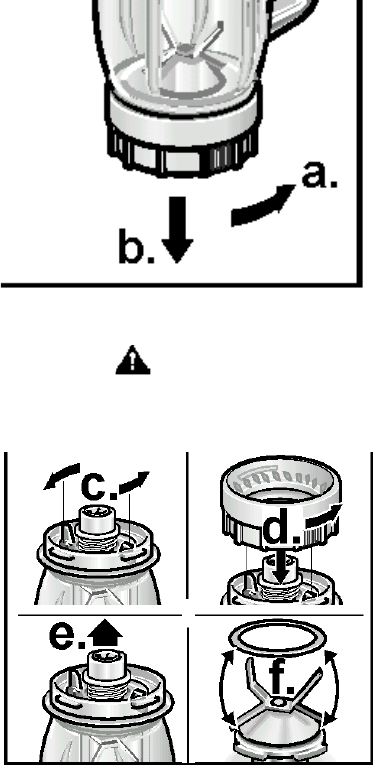
14
the blade assembly counterclockwise
until it stops and then lift up see figures
7c and 7e.
Figure 6.
CAUTION
Blade/base assembly is very sharp.
Handle with care.
Figure 7.
If the blade assembly is too tight to
turn by hand, the locking ring may
be used to loosen the blade assembly,
as shown in figure 7d. After loosening,
turn the blade assembly counter-
clockwise until it stops and then lift up.
The gasket may be removed for
cleaning, as shown in figure 7f.
Wash the blade/base assembly under
running water. Do not place the blade/
base assembly in the dishwasher or
allow it to stand in water. This will tend
to wash out the lubricant. After
cleaning, rinse thoroughly and dry
before using.
2. To assemble or reassemble blade/base
assembly into the blender, reverse the
steps that were used in the above to
remove it.
3. The blender is used in mode 3, see
table 1. To place the blender on the
power unit the arm must be rotated to
the down position. Depress the release
button, see 4a, and lower the arm so
that the arm is vertical and the high-
speed drive is straight up.
If you have
not already done so, remove the motor
drive cover from the high-speed drive
and place the blender on the high-speed
drive and turn counterclockwise to lock
the blender in place.
Placing Blender into Operation
Make sure that the power unit’s rotary
switch is in the off position, “O/Off.” Pull
the electrical cord or unwind it to the
necessary length and then plug into the
wall outlet. The blender is now ready for
operation.
Normally when blending, the blender jar
should be filled with the entire amount of
material to be blended, if possible, before
switching the appliance to On. The cover
and cover closure should always be in place
after filling the blender jar and before
switching the power unit to On. Any
subsequent additions to the blended
material should be made through the cover
opening, see figure 8. For solids and/or
granular material, remove the cover closure/
funnel to add the material, as shown in
figure 8a. For liquids, the closure/funnel
may be left in place and the liquids can be
added by pouring them into the closure/
funnel, see figure 8b.


















